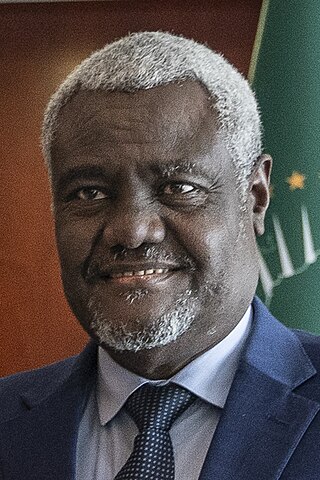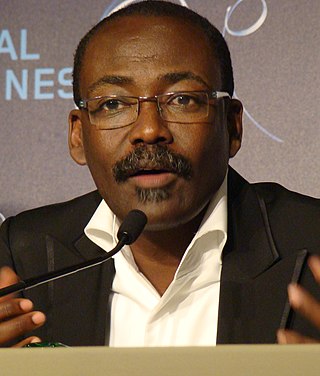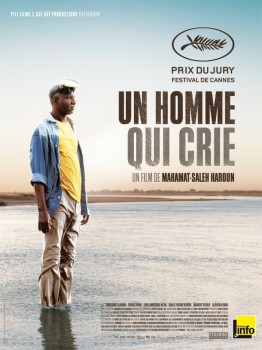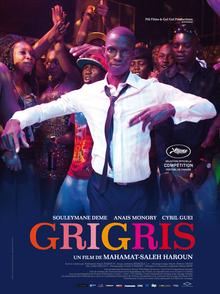Related Research Articles

Moussa Faki Mahamat is a Chadian politician and diplomat who has been the elected Chairperson of the African Union Commission since 14 March 2017. Previously he was Prime Minister of Chad from 24 June 2003 to 4 February 2005 and Minister of Foreign Affairs from April 2008 to January 2017. Faki, a member of the ruling Patriotic Salvation Movement (MPS), belongs to the Zaghawa ethnic group, the same group as the late President Idriss Déby.

Cinema of Africa covers both the history and present of the making or screening of films on the African continent, and also refers to the persons involved in this form of audiovisual culture. It dates back to the early 20th century, when film reels were the primary cinematic technology in use. During the colonial era, African life was shown only by the work of white, colonial, Western filmmakers, who depicted Africans in a negative fashion, as exotic "others". As there are more than 50 countries with audiovisual traditions, there is no one single 'African cinema'. Both historically and culturally, there are major regional differences between North African and sub-Saharan cinemas, and between the cinemas of different countries.

Mahamat-Saleh Haroun was born in 1961 in Abéché, Chad. He is a film director from Chad. He left Chad during the civil wars of the 1980s. Haroun is the first Chadian full-length film director. He both writes and directs his films. Though he has lived in France since 1982, most of his films have been set in and made in Chad.

The 63rd annual Venice International Film Festival, held in Venice, Italy, from 30 August to 9 September 2006.

The Cinema of Chad is small though growing. The first film made in the country appears to have been 1958 John Huston adventure film The Roots of Heaven, filmed when the country was still a part of French Equatorial Africa. Documentary filmmaker Edouard Sailly made a series of shorts in the 1960s depicting daily life in the country. During this period there were a number of cinemas in the country, including in N'Djamena Le Normandie, Le Vogue, the Rio, the Étoile and the Shéherazade, and also the Rex in Sarh, the Logone in Moundou and the Ciné Chachati in Abéché. The film industry suffered severely in the 1970s-80s as Chad became engulfed in a series of civil wars and foreign military interventions; film production stopped, and all the cinemas in Chad closed down. Following the ousting of dictator Hissène Habré by Idriss Déby in 1990 the situation in the country stabilised somewhat, allowing the development of a nascent film industry, most notably with the work of directors Mahamat-Saleh Haroun, Issa Serge Coelo and Abakar Chene Massar. Mahamat-Saleh Haroun has won awards at the Panafrican Film and Television Festival of Ouagadougou, Venice International Film Festival and the Cannes Film Festival. In January 2011 Le Normandie in N'Djamena, said to now be the only cinema in Chad, re-opened with government support.
Issa Serge Coelo is a Chadian film director. Born in Biltine, Chad, he studied history in Paris and film at the École supérieure de réalisation audiovisuelle (ÉSRA). He then worked as a cameraman at Métropole Télévision, France 3, TV5MONDE and CFI before creating the 1994 short film Un taxi pour Aouzou. The film was well-received, being nominated for a 1997 César Award in the category Best Short Film - Fiction. This was followed by the feature films Daresalam (2000) and Tartina City (2006). He also portrayed himself in the 1999 film Bye Bye Africa, which was directed by Chad's other prominent director Mahamat Saleh Haroun.

A Screaming Man is a 2010 drama film by Mahamat Saleh Haroun, starring Youssouf Djaoro and Diouc Koma. Set in 2006, it revolves around the civil war in Chad, and tells the story of a man who sends his son to war in order to regain his position at an upscale hotel. Themes of fatherhood and the culture of war are explored. Principal photography took place on location in N'Djamena and Abéché. The film won the Jury Prize at the 2010 Cannes Film Festival.

GriGris is a 2013 French-Chadian drama film directed by Mahamat Saleh Haroun, starring Soulémane Démé, Mariam Monory, Cyril Guei and Marius Yelolo. It is about a 25-year-old man with a paralysed leg who dreams of becoming a dancer, and starts to work for a gang of petrol smugglers. The film was produced through the French Pili Films with co-production support from the Chadian Goï Goï Productions. It also received support from Canal+, Ciné+, TV5Monde, Canal Horizons and the CNC. Filming started 29 October 2012.

Africultures is a publication of arts and culture about and from Africa and its diasporas. Based in Paris, it was founded in 1997 under the impetus of Olivier Barlet by journalists and academics such as Virginie Andriamirado, Gérald Arnaud, Tanella Boni, Sylvie Chalaye, Christophe Cassiau-Haurie, Fayçal Chehat, Soeuf Elbadawi, Boniface Mongo-Mboussa, etc. The magazine is managed by the association Africultures and it is published by L'Harmattan. Since 2012 the documentation produced by the magazine and its database made of over 45,000 biographies of artists and 55,000 description of books, music, films and institutions has been released under the open Creative Commons attribution share alike license.
Souleymane Démé is a Chadian actor. He is most notable for the critically acclaimed role in the film GriGris in which he played the title role.
Ahmed Hafiane is a Tunisian actor.
Un taxi pour Aouzou, is a 1994 Chadian short drama film directed by Issa Serge Coelo and produced by Dominique Andreani for Movimento Production. The film stars Abdoulaye Ahmat and Ali Baba Nour. The film revolves around Abdoulaye Ahmat, a Libyan woman falls in love with Ali Baba Nour, a Chadian man at the time of the Libyan-Chadian conflict.

Mohamed Abdelkrim Derkaoui is a Moroccan director and producer.
The Barber of the Poor District is a 1982 Moroccan film directed by Mohamed Reggab and adapted from a play of the same title by Youssef Fadel. It was the director's sole feature film, and became a Moroccan cult classic. It was screened at the first edition of the National Film Festival in Rabat, where it received as a special mention and the 10th edition of the National Film Festival as part of a series on Moroccan classics. Internationally, the film was screened at Three Continents Festival in 1983, and the Berlin International Film Festival in 1982. The debts incurred for the production of his sole feature film led to Reggab being imprisoned.
A Thousand and One Hands is a 1973 Moroccan film directed by Souheil Ben-Barka. It was screened abroad and received critical acclaim despite being censored in Morocco.
Imad Noury is a Spanish-Moroccan filmmaker.

Swel Noury is a Spanish-Moroccan filmmaker.
Virgins and Swallows is a 2008 Moroccan film directed by Moumen Smihi.
The Festival des Cinémas d'Afrique du pays d'Apt (FCAPA) is an annual international film festival on African cinema organised since 2003 in Apt, Vaucluse, France.
References
- ↑ "Kalala de Mahamat-Saleh Haroun - (2006) - Drame" (in French). Retrieved 2021-10-07.
- ↑ "Films: Africultures : Kalala". Africultures (in French). Retrieved 2021-10-07.
- ↑ "Kalala" . Retrieved 2021-10-07.
- ↑ "Kalala (2006)". BFI. Archived from the original on October 25, 2020. Retrieved 2021-10-07.
- ↑ "IFcinéma - Kalala". ifcinema.institutfrancais.com. Retrieved 2021-10-07.
- ↑ "Kalala: Film - The Guardian". www.theguardian.com. Retrieved 2021-10-07.
- ↑ "Kalala: Film 2006". moviepilot.de (in German). Retrieved 2021-10-07.
- ↑ "Africiné - Kalala". Africiné (in French). Retrieved 2021-10-07.
- ↑ AlloCine. "Kalala" (in French). Retrieved 2021-10-07.